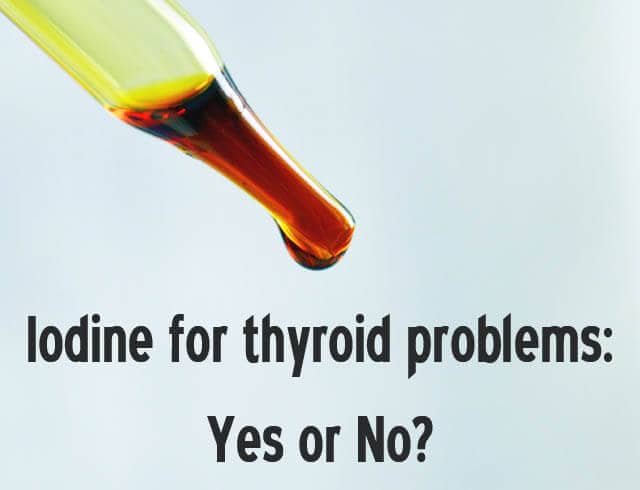Iodine is often suggested for people who suspect that they might have problems related to a low thyroid levels. As I’ve recently been (finally) diagnosed with an auto-immune thyroid condition, I’ve been researching this subject a lot lately. I am not a doctor and this is not medical advice, I’m just sharing personal information that was helpful to me….
It turns out, there are times when taking iodine can actually do more harm than good…
Is Iodine Good or Bad for Thyroid?
It depends.
As with any medical condition, there are many variations that fall under the broad category of “thyroid problems” and they must be handled differently.
I found this out the hard way. I had the symptoms of low thyroid for years and from research, knew that iodine could be helpful for thyroid troubles. After much research and at the recommendation of a chiropractor, I started taking iodine and noticed that I felt a lot worse. I figured it might be some kind of adjustment reaction and continued taking it but eventually decided to discontinue it since I didn’t feel any better.
History and research verify my own experience in this…
Data from a number of countries shows that countries who started adding iodine to salt to combat hypothyroidism saw rising rates of autoimmune thyroid problems. Chris Kresser explains:
The following is just a sample of studies around the world demonstrating this effect:
Why does this happen? Because increased intake, especially in supplement form, can increase the autoimmune attack on the thyroid. Iodine reduces the activity of an enzyme called thyroid peroxidase (TPO). TPO is required for proper thyroid hormone production.
The Confounding Factor
In my own treatment plan, I now avoid iodine as my particular type of thyroid problem makes it more harmful that helpful. In fact, some research shows that those with auto-immune thyroid disease will see some benefit just from avoiding iodine.
On the other hand, those with iodine-deficiency induced hypothyroidism can benefit from *careful* supplementation, but given the research showing the increased risk of autoimmune thyroid problems that can result, it is very important to check with a doctor first!
Dr. Paul Jaminet also proposes another factor that affects the iodine/autoimmunity relationship is the presence of selenium:
“Excess intake can cause an autoimmune thyroiditis that bears all the characteristics of Hashimoto’s. However, in animal studies this occurs only if selenium is deficient or in excess. Similarly, in animal studies very high intake can exacerbate a pre-existing autoimmune thyroiditis, but only if selenium is deficient or in excess.
With optimal selenium status, thyroid follicles are healthy, goiter is eliminated, and autoimmune markers like Th1/Th2 ratio and CD4+/CD8+ ratio are normalized over a wide range of iodine intake. It seems that optimizing selenium intake provides powerful protection against autoimmune thyroid disease, and provides tolerance of a wide range of intakes.”
The Bottom Line
I’ll be sharing my own thyroid journey as it unfolds and the protocol I’m using to reverse my symptoms. Anyone who suspects hypothyroidism or thyroid disease should be very careful about supplementation and consider selenium with (or in place of) iodine to see if symptoms improve. Dr. Terry Wahls strongly suggests testing your antibodies periodically to know if they are going up or down if you are making a diet or supplement change, and to be sure to work with the doctor prescribing any thyroid medication to monitor this.
Thyroid disorders (and any hormone-related problems) are complex conditions and it is important to find a good doctor or practitioner who can test the proper thyroid levels and do a thyroid ultrasound to know what the proper treatment plan should be.
This article was medically reviewed by Dr. Terry Wahls, a clinical professor of medicine and clinical research and has published over 60 peer-reviewed scientific abstracts, posters, and papers. As always, this is not personal medical advice and we recommend that you talk with your doctor.
Have you ever struggled with thyroid problems or suspect that you might? What has worked for you? Share below!


Leave a Reply